教学内容:Healthy eating(2)[下学期]
文档属性
| 名称 | 教学内容:Healthy eating(2)[下学期] | 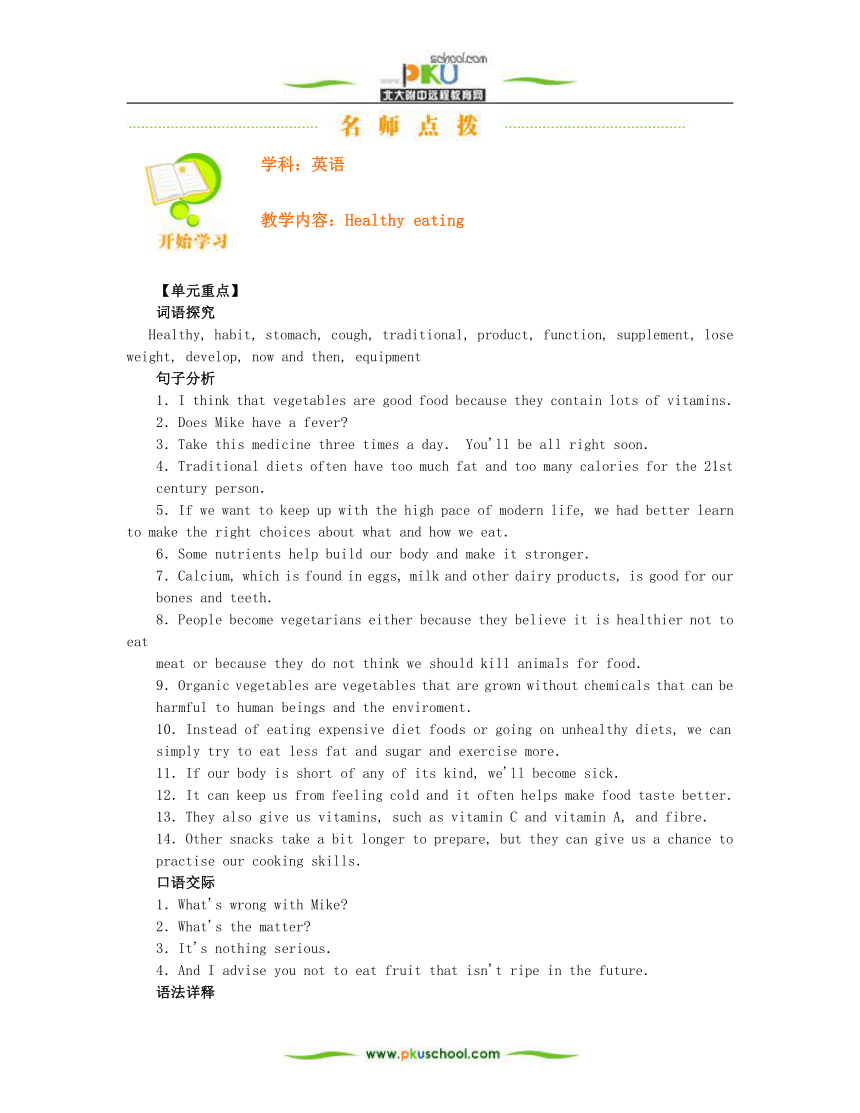 | |
| 格式 | rar | ||
| 文件大小 | 21.2KB | ||
| 资源类型 | 教案 | ||
| 版本资源 | |||
| 科目 | 英语 | ||
| 更新时间 | 2006-03-01 19:12:00 | ||
图片预览

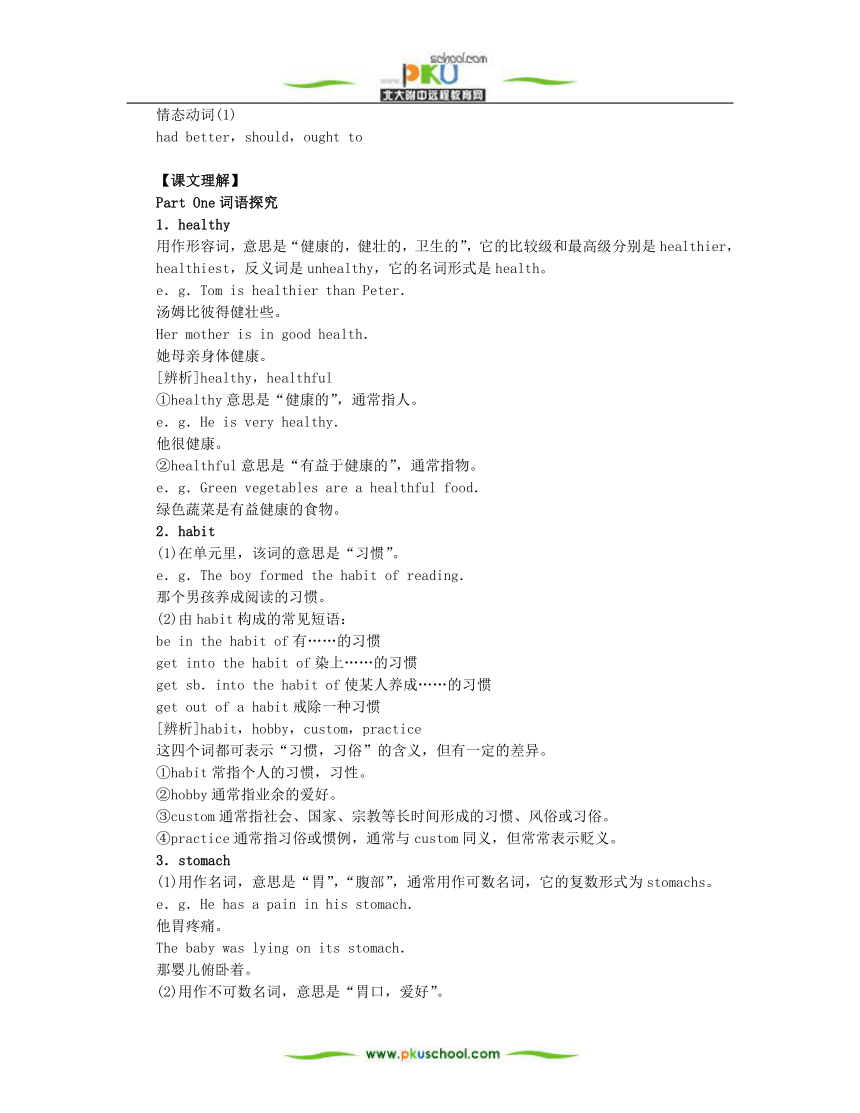
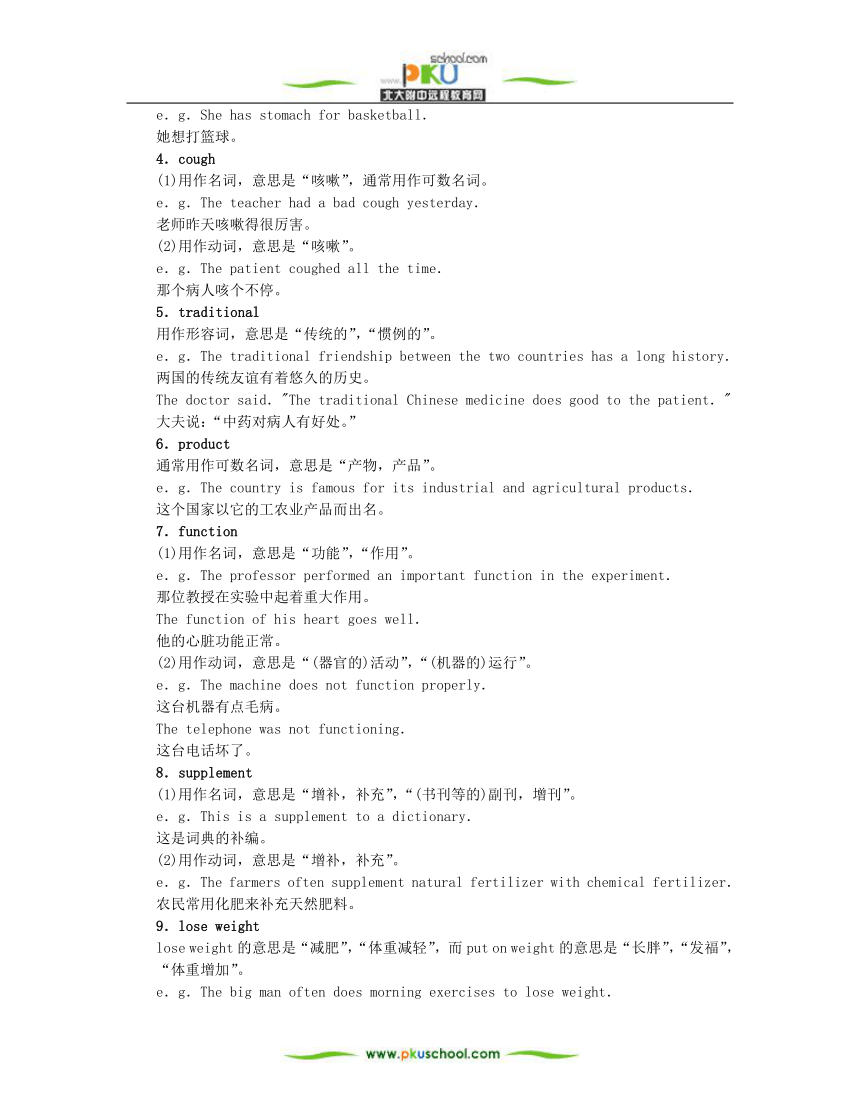
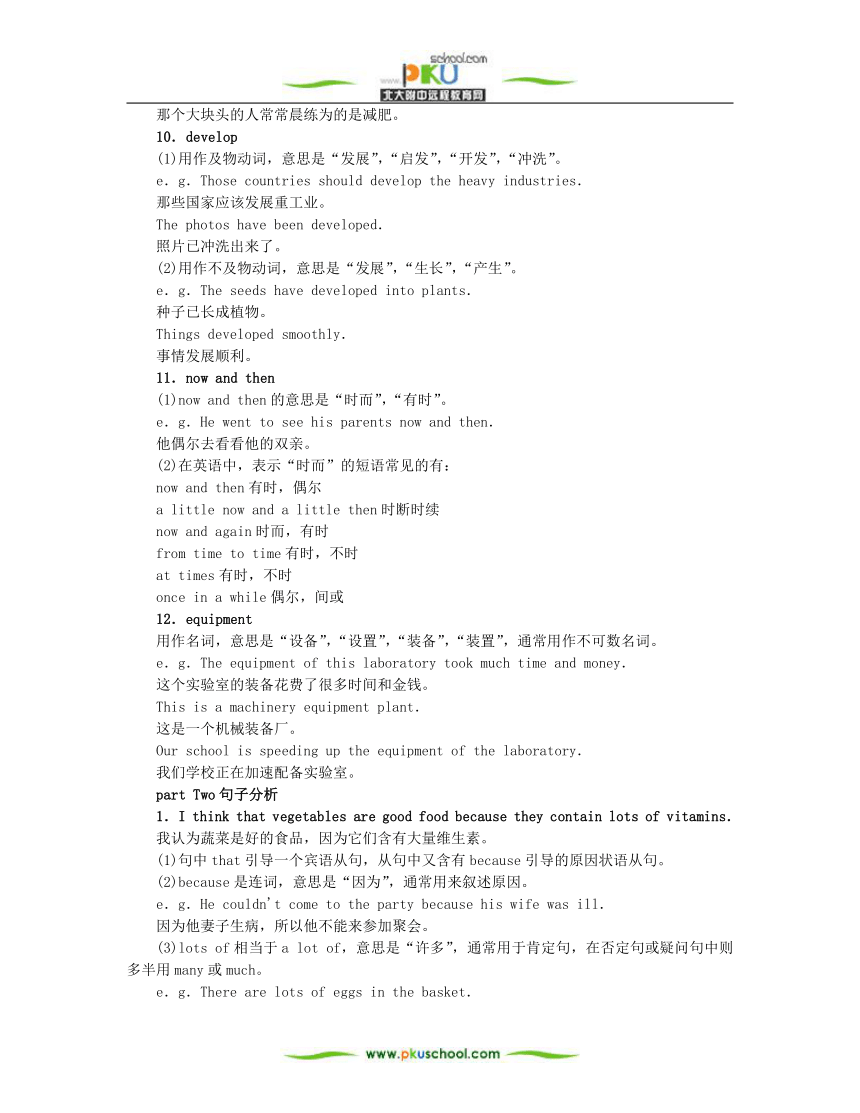
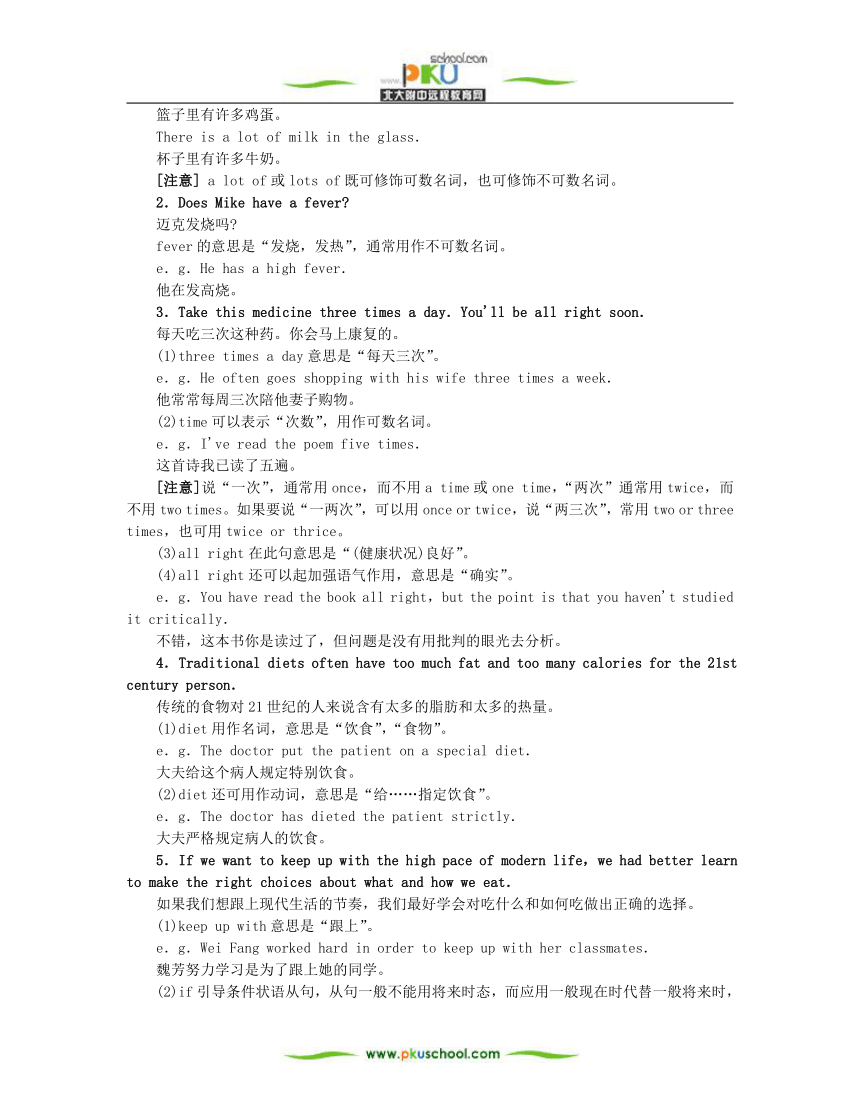
文档简介
学科:英语
教学内容:Healthy eating
【单元重点】
词语探究
Healthy, habit, stomach, cough, traditional, product, function, supplement, lose
weight, develop, now and then, equipment
句子分析
1.I think that vegetables are good food because they contain lots of vitamins.
2.Does Mike have a fever
3.Take this medicine three times a day. You'll be all right soon.
4.Traditional diets often have too much fat and too many calories for the 21st
century person.
5.If we want to keep up with the high pace of modern life, we had better learn to make the right choices about what and how we eat.
6.Some nutrients help build our body and make it stronger.
7.Calcium, which is found in eggs, milk and other dairy products, is good for our
bones and teeth.
8.People become vegetarians either because they believe it is healthier not to eat
meat or because they do not think we should kill animals for food.
9.Organic vegetables are vegetables that are grown without chemicals that can be
harmful to human beings and the enviroment.
10.Instead of eating expensive diet foods or going on unhealthy diets, we can
simply try to eat less fat and sugar and exercise more.
11.If our body is short of any of its kind, we'll become sick.
12.It can keep us from feeling cold and it often helps make food taste better.
13.They also give us vitamins, such as vitamin C and vitamin A, and fibre.
14.Other snacks take a bit longer to prepare, but they can give us a chance to
practise our cooking skills.
口语交际
1.What's wrong with Mike
2.What's the matter
3.It's nothing serious.
4.And I advise you not to eat fruit that isn't ripe in the future.
语法详释
情态动词(1)
had better,should,ought to
【课文理解】
Part One词语探究
1.healthy
用作形容词,意思是“健康的,健壮的,卫生的”,它的比较级和最高级分别是healthier,healthiest,反义词是unhealthy,它的名词形式是health。
e.g.Tom is healthier than Peter.
汤姆比彼得健壮些。
Her mother is in good health.
她母亲身体健康。
[辨析]healthy,healthful
①healthy意思是“健康的”,通常指人。
e.g.He is very healthy.
他很健康。
②healthful意思是“有益于健康的”,通常指物。
e.g.Green vegetables are a healthful food.
绿色蔬菜是有益健康的食物。
2.habit
(1)在单元里,该词的意思是“习惯”。
e.g.The boy formed the habit of reading.
那个男孩养成阅读的习惯。
(2)由habit构成的常见短语:
be in the habit of有……的习惯
get into the habit of染上……的习惯
get sb.into the habit of使某人养成……的习惯
get out of a habit戒除一种习惯
[辨析]habit,hobby,custom,practice
这四个词都可表示“习惯,习俗”的含义,但有一定的差异。
①habit常指个人的习惯,习性。
②hobby通常指业余的爱好。
③custom通常指社会、国家、宗教等长时间形成的习惯、风俗或习俗。
④practice通常指习俗或惯例,通常与custom同义,但常常表示贬义。
3.stomach
(1)用作名词,意思是“胃”,“腹部”,通常用作可数名词,它的复数形式为stomachs。
e.g.He has a pain in his stomach.
他胃疼痛。
The baby was lying on its stomach.
那婴儿俯卧着。
(2)用作不可数名词,意思是“胃口,爱好”。
e.g.She has stomach for basketball.
她想打篮球。
4.cough
(1)用作名词,意思是“咳嗽”,通常用作可数名词。
e.g.The teacher had a bad cough yesterday.
老师昨天咳嗽得很厉害。
(2)用作动词,意思是“咳嗽”。
e.g.The patient coughed all the time.
那个病人咳个不停。
5.traditional
用作形容词,意思是“传统的”,“惯例的”。
e.g.The traditional friendship between the two countries has a long history.
两国的传统友谊有着悠久的历史。
The doctor said."The traditional Chinese medicine does good to the patient."
大夫说:“中药对病人有好处。”
6.product
通常用作可数名词,意思是“产物,产品”。
e.g.The country is famous for its industrial and agricultural products.
这个国家以它的工农业产品而出名。
7.function
(1)用作名词,意思是“功能”,“作用”。
e.g.The professor performed an important function in the experiment.
那位教授在实验中起着重大作用。
The function of his heart goes well.
他的心脏功能正常。
(2)用作动词,意思是“(器官的)活动”,“(机器的)运行”。
e.g.The machine does not function properly.
这台机器有点毛病。
The telephone was not functioning.
这台电话坏了。
8.supplement
(1)用作名词,意思是“增补,补充”,“(书刊等的)副刊,增刊”。
e.g.This is a supplement to a dictionary.
这是词典的补编。
(2)用作动词,意思是“增补,补充”。
e.g.The farmers often supplement natural fertilizer with chemical fertilizer.
农民常用化肥来补充天然肥料。
9.lose weight
lose weight的意思是“减肥”,“体重减轻”,而put on weight的意思是“长胖”,“发福”,“体重增加”。
e.g.The big man often does morning exercises to lose weight.
那个大块头的人常常晨练为的是减肥。
10.develop
(1)用作及物动词,意思是“发展”,“启发”,“开发”,“冲洗”。
e.g.Those countries should develop the heavy industries.
那些国家应该发展重工业。
The photos have been developed.
照片已冲洗出来了。
(2)用作不及物动词,意思是“发展”,“生长”,“产生”。
e.g.The seeds have developed into plants.
种子已长成植物。
Things developed smoothly.
事情发展顺利。
11.now and then
(1)now and then的意思是“时而”,“有时”。
e.g.He went to see his parents now and then.
他偶尔去看看他的双亲。
(2)在英语中,表示“时而”的短语常见的有:
now and then有时,偶尔
a little now and a little then时断时续
now and again时而,有时
from time to time有时,不时
at times有时,不时
once in a while偶尔,间或
12.equipment
用作名词,意思是“设备”,“设置”,“装备”,“装置”,通常用作不可数名词。
e.g.The equipment of this laboratory took much time and money.
这个实验室的装备花费了很多时间和金钱。
This is a machinery equipment plant.
这是一个机械装备厂。
Our school is speeding up the equipment of the laboratory.
我们学校正在加速配备实验室。
part Two句子分析
1.I think that vegetables are good food because they contain lots of vitamins.
我认为蔬菜是好的食品,因为它们含有大量维生素。
(1)句中that引导一个宾语从句,从句中又含有because引导的原因状语从句。
(2)because是连词,意思是“因为”,通常用来叙述原因。
e.g.He couldn't come to the party because his wife was ill.
因为他妻子生病,所以他不能来参加聚会。
(3)lots of相当于a lot of,意思是“许多”,通常用于肯定句,在否定句或疑问句中则多半用many或much。
e.g.There are lots of eggs in the basket.
篮子里有许多鸡蛋。
There is a lot of milk in the glass.
杯子里有许多牛奶。
[注意] a lot of或lots of既可修饰可数名词,也可修饰不可数名词。
2.Does Mike have a fever
迈克发烧吗
fever的意思是“发烧,发热”,通常用作不可数名词。
e.g.He has a high fever.
他在发高烧。
3.Take this medicine three times a day.You'll be all right soon.
每天吃三次这种药。你会马上康复的。
(1)three times a day意思是“每天三次”。
e.g.He often goes shopping with his wife three times a week.
他常常每周三次陪他妻子购物。
(2)time可以表示“次数”,用作可数名词。
e.g.I've read the poem five times.
这首诗我已读了五遍。
[注意]说“一次”,通常用once,而不用a time或one time,“两次”通常用twice,而不用two times。如果要说“一两次”,可以用once or twice,说“两三次”,常用two or three times,也可用twice or thrice。
(3)all right在此句意思是“(健康状况)良好”。
(4)all right还可以起加强语气作用,意思是“确实”。
e.g.You have read the book all right,but the point is that you haven't studied it critically.
不错,这本书你是读过了,但问题是没有用批判的眼光去分析。
4.Traditional diets often have too much fat and too many calories for the 21st century person.
传统的食物对21世纪的人来说含有太多的脂肪和太多的热量。
(1)diet用作名词,意思是“饮食”,“食物”。
e.g.The doctor put the patient on a special diet.
大夫给这个病人规定特别饮食。
(2)diet还可用作动词,意思是“给……指定饮食”。
e.g.The doctor has dieted the patient strictly.
大夫严格规定病人的饮食。
5.If we want to keep up with the high pace of modern life,we had better learn to make the right choices about what and how we eat.
如果我们想跟上现代生活的节奏,我们最好学会对吃什么和如何吃做出正确的选择。
(1)keep up with意思是“跟上”。
e.g.Wei Fang worked hard in order to keep up with her classmates.
魏芳努力学习是为了跟上她的同学。
(2)if引导条件状语从句,从句一般不能用将来时态,而应用一般现在时代替一般将来时,一般过去时代替过去将来时。
e.g.If I have time,I'll visit you.
如果我有时间,我就来看望你们。
6.Some nutrients help build our body and make it stronger.
有些营养食品有助于增强我们的体质而且使身体更加强壮。
(1)build one's body在这里的意思是“增强某人的体质”,其中build可用build up来代替,意思是“使增强”,“使强壮”,body有单复数变化形式。
e.g.He went to live in the countryside and soon built up his body.
他到农村去住,身体很快就强壮起来了。
Taking exercises can build our bodies.
运动能使我们身体强壮。
(2)句中it代替our body。
7.Calcium,which is found in eggs,milk and other dairy products,is good for our bones and teeth.
钙对我们的骨骼和牙齿是有好处的,钙存在于鸡蛋、牛奶和其他日常食品里。
(1)句中which is found in eggs,milk and other dairy products是非限制性定语从句,修饰先行词calcium。非限制性定语从句对于它所修饰的那个先行词,通常只是一个附加说明,如果省略掉,主句的意思依然完整。一般不能用关系代词that来引导非限制性定语从句。
e.g.Jack London,who was one of the famous American writers,lived in a very adventurous life.
杰克·伦敦过着非常冒险的生活,他是著名的美国作家之一。
上句中,如果去掉who was one of the famous American writers,其意义仍然完整。
(2)be good for意思是“对……有益”,后面接表示人或事物的名词。
e.g.Practice is good for health.
锻炼有益于健康。
[辨析]be good for,be good at,be good to
①be good for意思是“对……有益(有利,有用)”;后面通常接表示人或事物的名词。
e.g.Green food is good for us.
绿色食品对我们有益。
②be good at意思是“擅长,善于”,后面通常接名词、代词或动名词。
e.g.He is good at drawing.
他擅长绘画。
③be good to意思是“对……友好”,后面通常接表示人的或人格化的名词。
e.g.He is often good to me.
他常对我好。
8.People become vegetarians either because they believe it is healthier not to
eat meat or because they do not think we should kill animals for food.
人们成为素食主义者要么是因为他们认为不吃肉会更健康,要么是因为他们认为我们不应该捕杀动物作为食物。
句中either...or...是并列连词,意思是“要么……要么……”,“是……,还是……”,“不是……,就是……”,通常引导并列成分或并列分句。
e.g. Either you or he has to go there.
或者是你或者是他得去那儿。(并列主语)
[注意]either...or...引导并列主语,谓语动词的数一般和最近的主语一致。
Do you speak either French or English
你是讲法语还是英语。(并列宾语)
You either go or don't go.
你要么去要么不去。(并列谓语)
Either you come early or you stay here.
要么你来早点,要么你呆在这儿。(并列分句)
9.Organic vegetables are vegetables that are grown without chemicals that
can be harmful to human beings and the enviroment.
有机蔬菜就是不用化学药品种植的蔬菜,化学药品对人类和环境是有害的。
(1)句子that are grown without chemicals是定语从句,修饰先行词vegetables,that can be harmful to human beings and the enviroment也是定语从句,修饰先行词chemicals。
(2)be harmful to意思是“对……有害的”。
e.g.This medicine is harmful to our health.
这种药品是对我们健康有害的。
10.Instead of eating expensive diet foods or going on unhealthy diets,we can
simply try to eat less fat and sugar and exercise more.
我们只能尽量少吃脂肪和糖,并且多锻炼,而不吃昂贵的食物或依靠不健康的节食。
(1)instead of是短语介词,意思是“代替”,“而不是”。它后面一般跟名词,代词,动词-ing或介词短语作它的宾语。
e.g.Shall we have fish instead of meat today
我们今天吃鱼不吃肉,好吗
If I had not got a cold,I'd be working instead of lying here in bed.
如果我没感冒,我就干活了,而不是在这里躺在床上。
We'll have tea in the garden instead of in the house.
我们将在花园里,而不是在房子里喝茶。
(2)instead单独使用时,与instead of不同,instead是副词,意思是“代替”,“而是”。
e.g.Last summer I went to Qingdao.This summer I'm going to Dalian instead.
去年夏天我去了青岛。今年夏天我将去大连。
Instead of going to Qingdao,I'm going to Dalian this year.
今年夏天我将去大连,而不去青岛。
以上两句意思一样,但是用instead这个副词时,句子中的动作是被“取”的,即要去做的,而用instead of时,of后面的动作是被“舍”的,即不去做的。
(3)go on在此句中意思是“依靠”。
e.g.The poor went on welfare in those days.
穷人们在过去靠救济生活。
11.If our body is short of any of its kind,we'll become sick.
如果我们身体缺少某种东西,我们就会生病。
be short of意思是“缺少,缺乏”。
e.g.He is often short of money.他总是缺钱用。
12.It can keep us from feeling cold and it often helps make food taste better.
这能防止我们感到寒冷,而且常使食物味道更好。
(1)keep...from...意思是“使……不做……”,“隐瞒”。
e.g.Nothing can keep us from changing the plan.
什么也不能使我们改变计划。
He kept the secret from us.
他隐瞒那个秘密,没有告诉我们。
(2)taste在此句中用作名词,意思是“味道”,“滋味”。
e.g.Sugar has a sweet taste.
糖有甜味。
(3)taste还可用作及物动词,意思是“品尝”,用作不及物动词,意思是“有……的味道”,“尝起来”,后面通常接表语。
e.g.Can you taste anything strange in the soup
你尝得出这汤里有什么怪味道吗
This food tastes sweet.
这食品吃起来很甜。
13.They also give us vitamins,such as vitamin C and vitamin A,and fibre.
他们也给我们提供了像维生素C和维生素A这样的维生素和纤维素。
such as意思是“像……样的”。
e.g.I like drinks such as tea and soda.
我喜欢诸如茶和汽水之类的饮料。
I like people such as my uncle.
我喜欢我叔父那样的人。
14.Other snacks take a bit longer to prepare,but they can give us a chance to practise our cooking skills.
其他的小吃要花更长时间去准备,但他们给我们提供了训练我们烹饪技术的机会。
(1)bit用作名词,意思是“一点”,“一些”。
e.g.Give him a bit of water.
给他一点水。
(2)a bit放在形容词、副词前,用作状语,也可作宾语,表语,a bit of放在名词前,用作定语。
e.g.Your article is a bit long.
你的文章有点儿长。
He has a bit of money.
他有点钱。
[注意]not a bit相当于not at all,意思是“毫不”,“根本不”,not a little相当于very,意思是“非常”。
e.g.He is not a bit tired.
他一点儿也不累。
He is not a little tired.
他非常累。
Part Three口语交际
1.What's wrong with Mike
迈克怎么啦
2.What's the matter
怎么啦
以上两个句型,通常用于询问别人出了什么毛病。
e.g.What's the matter with Wang Fei
王飞怎么啦
He has a pain in his back.
他背部有点疼痛。
What is wrong with the watch
手表怎么啦
It doesn't work.
它不走了。
3.It's nothing serious.
没关系。
这个句型通常用于说话人认为没什么要紧时。
e.g.I think that may be a problem.But it's nothing serious.
我认为这可能是一个问题。但这是不要紧的。
4.And I advise you not to eat fruit that isn't ripe in the future.
我劝你今后不要吃还没成熟的水果。
这是一个劝告他人做或不做某事的句型。
e.g.I advise you to think it over before you give her an answer.
我劝你考虑一下再答复她。
He advised me not to read in bed.
他劝我别躺在床上看书。
Part Four语法详释
情态动词(I)
had better,should,ought to
1.had better
had better的意思是“最好”,后面接动词原形,表示说话人希望对方做什么。had better not则表示说话人希望对方最好不要做什么。
e.g.You had better see a doctor.
你最好找大夫看看。
You had better not go home now.
你现在最好不要回家。
2.should
should通常表示劝告,建议,意思是“应该”。
e.g.You should keep your promise.
你应该履行诺言。
You should invite him to the party.
你应该邀请他参加舞会。
3.ought to
(1)ought to常用来表示因为有责任、义务,而应该做某事,通常与should意思相近。
e.g.The students ought to obey the school rules.
学生们应遵守校规。
Oughtn't we to give him a chance to try
我们难道不应该给他一个尝试的机会吗
(2)ought to也常用来表示劝告或建议,意思是“应当”,“宜于”。
e.g.There ought to be more buses during the rush hours.
在上下班乘客拥挤的时刻,公共汽车应当多一点。
(3)ought to还可表示猜测,意思是“理应”,“总应该”。
e.g.If he started at seven,he ought to be here now.
要是他七点钟出发,这会儿总应该到了。
教学内容:Healthy eating
【单元重点】
词语探究
Healthy, habit, stomach, cough, traditional, product, function, supplement, lose
weight, develop, now and then, equipment
句子分析
1.I think that vegetables are good food because they contain lots of vitamins.
2.Does Mike have a fever
3.Take this medicine three times a day. You'll be all right soon.
4.Traditional diets often have too much fat and too many calories for the 21st
century person.
5.If we want to keep up with the high pace of modern life, we had better learn to make the right choices about what and how we eat.
6.Some nutrients help build our body and make it stronger.
7.Calcium, which is found in eggs, milk and other dairy products, is good for our
bones and teeth.
8.People become vegetarians either because they believe it is healthier not to eat
meat or because they do not think we should kill animals for food.
9.Organic vegetables are vegetables that are grown without chemicals that can be
harmful to human beings and the enviroment.
10.Instead of eating expensive diet foods or going on unhealthy diets, we can
simply try to eat less fat and sugar and exercise more.
11.If our body is short of any of its kind, we'll become sick.
12.It can keep us from feeling cold and it often helps make food taste better.
13.They also give us vitamins, such as vitamin C and vitamin A, and fibre.
14.Other snacks take a bit longer to prepare, but they can give us a chance to
practise our cooking skills.
口语交际
1.What's wrong with Mike
2.What's the matter
3.It's nothing serious.
4.And I advise you not to eat fruit that isn't ripe in the future.
语法详释
情态动词(1)
had better,should,ought to
【课文理解】
Part One词语探究
1.healthy
用作形容词,意思是“健康的,健壮的,卫生的”,它的比较级和最高级分别是healthier,healthiest,反义词是unhealthy,它的名词形式是health。
e.g.Tom is healthier than Peter.
汤姆比彼得健壮些。
Her mother is in good health.
她母亲身体健康。
[辨析]healthy,healthful
①healthy意思是“健康的”,通常指人。
e.g.He is very healthy.
他很健康。
②healthful意思是“有益于健康的”,通常指物。
e.g.Green vegetables are a healthful food.
绿色蔬菜是有益健康的食物。
2.habit
(1)在单元里,该词的意思是“习惯”。
e.g.The boy formed the habit of reading.
那个男孩养成阅读的习惯。
(2)由habit构成的常见短语:
be in the habit of有……的习惯
get into the habit of染上……的习惯
get sb.into the habit of使某人养成……的习惯
get out of a habit戒除一种习惯
[辨析]habit,hobby,custom,practice
这四个词都可表示“习惯,习俗”的含义,但有一定的差异。
①habit常指个人的习惯,习性。
②hobby通常指业余的爱好。
③custom通常指社会、国家、宗教等长时间形成的习惯、风俗或习俗。
④practice通常指习俗或惯例,通常与custom同义,但常常表示贬义。
3.stomach
(1)用作名词,意思是“胃”,“腹部”,通常用作可数名词,它的复数形式为stomachs。
e.g.He has a pain in his stomach.
他胃疼痛。
The baby was lying on its stomach.
那婴儿俯卧着。
(2)用作不可数名词,意思是“胃口,爱好”。
e.g.She has stomach for basketball.
她想打篮球。
4.cough
(1)用作名词,意思是“咳嗽”,通常用作可数名词。
e.g.The teacher had a bad cough yesterday.
老师昨天咳嗽得很厉害。
(2)用作动词,意思是“咳嗽”。
e.g.The patient coughed all the time.
那个病人咳个不停。
5.traditional
用作形容词,意思是“传统的”,“惯例的”。
e.g.The traditional friendship between the two countries has a long history.
两国的传统友谊有着悠久的历史。
The doctor said."The traditional Chinese medicine does good to the patient."
大夫说:“中药对病人有好处。”
6.product
通常用作可数名词,意思是“产物,产品”。
e.g.The country is famous for its industrial and agricultural products.
这个国家以它的工农业产品而出名。
7.function
(1)用作名词,意思是“功能”,“作用”。
e.g.The professor performed an important function in the experiment.
那位教授在实验中起着重大作用。
The function of his heart goes well.
他的心脏功能正常。
(2)用作动词,意思是“(器官的)活动”,“(机器的)运行”。
e.g.The machine does not function properly.
这台机器有点毛病。
The telephone was not functioning.
这台电话坏了。
8.supplement
(1)用作名词,意思是“增补,补充”,“(书刊等的)副刊,增刊”。
e.g.This is a supplement to a dictionary.
这是词典的补编。
(2)用作动词,意思是“增补,补充”。
e.g.The farmers often supplement natural fertilizer with chemical fertilizer.
农民常用化肥来补充天然肥料。
9.lose weight
lose weight的意思是“减肥”,“体重减轻”,而put on weight的意思是“长胖”,“发福”,“体重增加”。
e.g.The big man often does morning exercises to lose weight.
那个大块头的人常常晨练为的是减肥。
10.develop
(1)用作及物动词,意思是“发展”,“启发”,“开发”,“冲洗”。
e.g.Those countries should develop the heavy industries.
那些国家应该发展重工业。
The photos have been developed.
照片已冲洗出来了。
(2)用作不及物动词,意思是“发展”,“生长”,“产生”。
e.g.The seeds have developed into plants.
种子已长成植物。
Things developed smoothly.
事情发展顺利。
11.now and then
(1)now and then的意思是“时而”,“有时”。
e.g.He went to see his parents now and then.
他偶尔去看看他的双亲。
(2)在英语中,表示“时而”的短语常见的有:
now and then有时,偶尔
a little now and a little then时断时续
now and again时而,有时
from time to time有时,不时
at times有时,不时
once in a while偶尔,间或
12.equipment
用作名词,意思是“设备”,“设置”,“装备”,“装置”,通常用作不可数名词。
e.g.The equipment of this laboratory took much time and money.
这个实验室的装备花费了很多时间和金钱。
This is a machinery equipment plant.
这是一个机械装备厂。
Our school is speeding up the equipment of the laboratory.
我们学校正在加速配备实验室。
part Two句子分析
1.I think that vegetables are good food because they contain lots of vitamins.
我认为蔬菜是好的食品,因为它们含有大量维生素。
(1)句中that引导一个宾语从句,从句中又含有because引导的原因状语从句。
(2)because是连词,意思是“因为”,通常用来叙述原因。
e.g.He couldn't come to the party because his wife was ill.
因为他妻子生病,所以他不能来参加聚会。
(3)lots of相当于a lot of,意思是“许多”,通常用于肯定句,在否定句或疑问句中则多半用many或much。
e.g.There are lots of eggs in the basket.
篮子里有许多鸡蛋。
There is a lot of milk in the glass.
杯子里有许多牛奶。
[注意] a lot of或lots of既可修饰可数名词,也可修饰不可数名词。
2.Does Mike have a fever
迈克发烧吗
fever的意思是“发烧,发热”,通常用作不可数名词。
e.g.He has a high fever.
他在发高烧。
3.Take this medicine three times a day.You'll be all right soon.
每天吃三次这种药。你会马上康复的。
(1)three times a day意思是“每天三次”。
e.g.He often goes shopping with his wife three times a week.
他常常每周三次陪他妻子购物。
(2)time可以表示“次数”,用作可数名词。
e.g.I've read the poem five times.
这首诗我已读了五遍。
[注意]说“一次”,通常用once,而不用a time或one time,“两次”通常用twice,而不用two times。如果要说“一两次”,可以用once or twice,说“两三次”,常用two or three times,也可用twice or thrice。
(3)all right在此句意思是“(健康状况)良好”。
(4)all right还可以起加强语气作用,意思是“确实”。
e.g.You have read the book all right,but the point is that you haven't studied it critically.
不错,这本书你是读过了,但问题是没有用批判的眼光去分析。
4.Traditional diets often have too much fat and too many calories for the 21st century person.
传统的食物对21世纪的人来说含有太多的脂肪和太多的热量。
(1)diet用作名词,意思是“饮食”,“食物”。
e.g.The doctor put the patient on a special diet.
大夫给这个病人规定特别饮食。
(2)diet还可用作动词,意思是“给……指定饮食”。
e.g.The doctor has dieted the patient strictly.
大夫严格规定病人的饮食。
5.If we want to keep up with the high pace of modern life,we had better learn to make the right choices about what and how we eat.
如果我们想跟上现代生活的节奏,我们最好学会对吃什么和如何吃做出正确的选择。
(1)keep up with意思是“跟上”。
e.g.Wei Fang worked hard in order to keep up with her classmates.
魏芳努力学习是为了跟上她的同学。
(2)if引导条件状语从句,从句一般不能用将来时态,而应用一般现在时代替一般将来时,一般过去时代替过去将来时。
e.g.If I have time,I'll visit you.
如果我有时间,我就来看望你们。
6.Some nutrients help build our body and make it stronger.
有些营养食品有助于增强我们的体质而且使身体更加强壮。
(1)build one's body在这里的意思是“增强某人的体质”,其中build可用build up来代替,意思是“使增强”,“使强壮”,body有单复数变化形式。
e.g.He went to live in the countryside and soon built up his body.
他到农村去住,身体很快就强壮起来了。
Taking exercises can build our bodies.
运动能使我们身体强壮。
(2)句中it代替our body。
7.Calcium,which is found in eggs,milk and other dairy products,is good for our bones and teeth.
钙对我们的骨骼和牙齿是有好处的,钙存在于鸡蛋、牛奶和其他日常食品里。
(1)句中which is found in eggs,milk and other dairy products是非限制性定语从句,修饰先行词calcium。非限制性定语从句对于它所修饰的那个先行词,通常只是一个附加说明,如果省略掉,主句的意思依然完整。一般不能用关系代词that来引导非限制性定语从句。
e.g.Jack London,who was one of the famous American writers,lived in a very adventurous life.
杰克·伦敦过着非常冒险的生活,他是著名的美国作家之一。
上句中,如果去掉who was one of the famous American writers,其意义仍然完整。
(2)be good for意思是“对……有益”,后面接表示人或事物的名词。
e.g.Practice is good for health.
锻炼有益于健康。
[辨析]be good for,be good at,be good to
①be good for意思是“对……有益(有利,有用)”;后面通常接表示人或事物的名词。
e.g.Green food is good for us.
绿色食品对我们有益。
②be good at意思是“擅长,善于”,后面通常接名词、代词或动名词。
e.g.He is good at drawing.
他擅长绘画。
③be good to意思是“对……友好”,后面通常接表示人的或人格化的名词。
e.g.He is often good to me.
他常对我好。
8.People become vegetarians either because they believe it is healthier not to
eat meat or because they do not think we should kill animals for food.
人们成为素食主义者要么是因为他们认为不吃肉会更健康,要么是因为他们认为我们不应该捕杀动物作为食物。
句中either...or...是并列连词,意思是“要么……要么……”,“是……,还是……”,“不是……,就是……”,通常引导并列成分或并列分句。
e.g. Either you or he has to go there.
或者是你或者是他得去那儿。(并列主语)
[注意]either...or...引导并列主语,谓语动词的数一般和最近的主语一致。
Do you speak either French or English
你是讲法语还是英语。(并列宾语)
You either go or don't go.
你要么去要么不去。(并列谓语)
Either you come early or you stay here.
要么你来早点,要么你呆在这儿。(并列分句)
9.Organic vegetables are vegetables that are grown without chemicals that
can be harmful to human beings and the enviroment.
有机蔬菜就是不用化学药品种植的蔬菜,化学药品对人类和环境是有害的。
(1)句子that are grown without chemicals是定语从句,修饰先行词vegetables,that can be harmful to human beings and the enviroment也是定语从句,修饰先行词chemicals。
(2)be harmful to意思是“对……有害的”。
e.g.This medicine is harmful to our health.
这种药品是对我们健康有害的。
10.Instead of eating expensive diet foods or going on unhealthy diets,we can
simply try to eat less fat and sugar and exercise more.
我们只能尽量少吃脂肪和糖,并且多锻炼,而不吃昂贵的食物或依靠不健康的节食。
(1)instead of是短语介词,意思是“代替”,“而不是”。它后面一般跟名词,代词,动词-ing或介词短语作它的宾语。
e.g.Shall we have fish instead of meat today
我们今天吃鱼不吃肉,好吗
If I had not got a cold,I'd be working instead of lying here in bed.
如果我没感冒,我就干活了,而不是在这里躺在床上。
We'll have tea in the garden instead of in the house.
我们将在花园里,而不是在房子里喝茶。
(2)instead单独使用时,与instead of不同,instead是副词,意思是“代替”,“而是”。
e.g.Last summer I went to Qingdao.This summer I'm going to Dalian instead.
去年夏天我去了青岛。今年夏天我将去大连。
Instead of going to Qingdao,I'm going to Dalian this year.
今年夏天我将去大连,而不去青岛。
以上两句意思一样,但是用instead这个副词时,句子中的动作是被“取”的,即要去做的,而用instead of时,of后面的动作是被“舍”的,即不去做的。
(3)go on在此句中意思是“依靠”。
e.g.The poor went on welfare in those days.
穷人们在过去靠救济生活。
11.If our body is short of any of its kind,we'll become sick.
如果我们身体缺少某种东西,我们就会生病。
be short of意思是“缺少,缺乏”。
e.g.He is often short of money.他总是缺钱用。
12.It can keep us from feeling cold and it often helps make food taste better.
这能防止我们感到寒冷,而且常使食物味道更好。
(1)keep...from...意思是“使……不做……”,“隐瞒”。
e.g.Nothing can keep us from changing the plan.
什么也不能使我们改变计划。
He kept the secret from us.
他隐瞒那个秘密,没有告诉我们。
(2)taste在此句中用作名词,意思是“味道”,“滋味”。
e.g.Sugar has a sweet taste.
糖有甜味。
(3)taste还可用作及物动词,意思是“品尝”,用作不及物动词,意思是“有……的味道”,“尝起来”,后面通常接表语。
e.g.Can you taste anything strange in the soup
你尝得出这汤里有什么怪味道吗
This food tastes sweet.
这食品吃起来很甜。
13.They also give us vitamins,such as vitamin C and vitamin A,and fibre.
他们也给我们提供了像维生素C和维生素A这样的维生素和纤维素。
such as意思是“像……样的”。
e.g.I like drinks such as tea and soda.
我喜欢诸如茶和汽水之类的饮料。
I like people such as my uncle.
我喜欢我叔父那样的人。
14.Other snacks take a bit longer to prepare,but they can give us a chance to practise our cooking skills.
其他的小吃要花更长时间去准备,但他们给我们提供了训练我们烹饪技术的机会。
(1)bit用作名词,意思是“一点”,“一些”。
e.g.Give him a bit of water.
给他一点水。
(2)a bit放在形容词、副词前,用作状语,也可作宾语,表语,a bit of放在名词前,用作定语。
e.g.Your article is a bit long.
你的文章有点儿长。
He has a bit of money.
他有点钱。
[注意]not a bit相当于not at all,意思是“毫不”,“根本不”,not a little相当于very,意思是“非常”。
e.g.He is not a bit tired.
他一点儿也不累。
He is not a little tired.
他非常累。
Part Three口语交际
1.What's wrong with Mike
迈克怎么啦
2.What's the matter
怎么啦
以上两个句型,通常用于询问别人出了什么毛病。
e.g.What's the matter with Wang Fei
王飞怎么啦
He has a pain in his back.
他背部有点疼痛。
What is wrong with the watch
手表怎么啦
It doesn't work.
它不走了。
3.It's nothing serious.
没关系。
这个句型通常用于说话人认为没什么要紧时。
e.g.I think that may be a problem.But it's nothing serious.
我认为这可能是一个问题。但这是不要紧的。
4.And I advise you not to eat fruit that isn't ripe in the future.
我劝你今后不要吃还没成熟的水果。
这是一个劝告他人做或不做某事的句型。
e.g.I advise you to think it over before you give her an answer.
我劝你考虑一下再答复她。
He advised me not to read in bed.
他劝我别躺在床上看书。
Part Four语法详释
情态动词(I)
had better,should,ought to
1.had better
had better的意思是“最好”,后面接动词原形,表示说话人希望对方做什么。had better not则表示说话人希望对方最好不要做什么。
e.g.You had better see a doctor.
你最好找大夫看看。
You had better not go home now.
你现在最好不要回家。
2.should
should通常表示劝告,建议,意思是“应该”。
e.g.You should keep your promise.
你应该履行诺言。
You should invite him to the party.
你应该邀请他参加舞会。
3.ought to
(1)ought to常用来表示因为有责任、义务,而应该做某事,通常与should意思相近。
e.g.The students ought to obey the school rules.
学生们应遵守校规。
Oughtn't we to give him a chance to try
我们难道不应该给他一个尝试的机会吗
(2)ought to也常用来表示劝告或建议,意思是“应当”,“宜于”。
e.g.There ought to be more buses during the rush hours.
在上下班乘客拥挤的时刻,公共汽车应当多一点。
(3)ought to还可表示猜测,意思是“理应”,“总应该”。
e.g.If he started at seven,he ought to be here now.
要是他七点钟出发,这会儿总应该到了。
